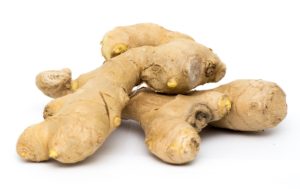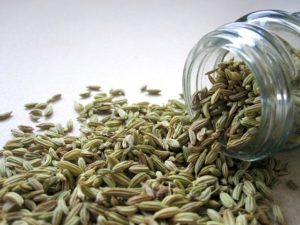For many, a cup of tea is the best drink for taking a break. Aside from this, drinking herbal tea has a number of digestive health benifits. Whether it’s indigestion, gas, stomach aches, bloating, constipation, or diarrhea, there is an herb out there that can help you. Many of these herbs are also anti-bacterial against the bad guys in our gut (they don’t harm the good guys).
To properly prepare a good cup of herbal tea, pour boiling water over the herb and cover. Steep for 15-20. Keep in mind that the longer some herbs steep, the more bitter the infusion can taste. To sweeten add honey, stevia, or maple syrup. Aim to drink 3 cups of herbal tea per day. Don’t be afraid to mix and match your favourite herbs to create unique flavor combinations.
Herbs that improve digestion:
1. Chamomile
Chamomile has anti-spasmodic, anti-inflammatory, and anti-bacterial properties. It is useful for preventing and relieving stomach cramps, calming the nervous system, reducing gas and bloating, and helps with nausea, heartburn and headaches. Have a cup after work when you need to relax. This is a great one for children too!
2. Lemon balm (Melissa)
Lemon balm is a member of the mint family that calms the digestive system. A study conducted by the University of Michigan Health System, revealed that lemon balm possesses an oil called terpenes. Terpenes help reduce indigestion and acid reflux as well as relieve gas and bloating. It is also one of the best herbs for tension, anxiety, and stress. Lemon balm is easy to grow and tastes fantastic hot or cold. Try making an ice-tea sweeten with honey.
3. Ginger
Ginger has been used for over 2000 years to help with digestive disorders. It is warming and especially helpful for those who are often cold (not so great for those who tend towards heat). The best way to have ginger tea is to make it yourself by crushing it up, boiling it for 20-30 minutes, and then putting it through a tea strainer. The freshness of the root is what will give you the best results.
Ginger increases saliva flow, intestinal motility, and the absorption of nutrients. It helps with gas and bloating, and is most known for reducing nausea. Try drinking a bit with lemon water about 15 minutes before a meal to prepare the body for digestion.

4. Marshmallow Root
Marshmallow is juicy, smoothing, and soothing! It contains a substance called mucilage which coats the esophagus, stomach, and intestines. It has a cooling affect which makes it great for hot conditions likes acid reflux, diarrhea, colitis, and Crohn’s. Marshmallow root also contains flavanoids, which have anti-inflammatory properties.
To really get the benefits of marshmallow root, you need to drink about 3 cups a day regularly. To prepare, add 1 tablespoon of marshmallow root to 1 cup of water. Cover and allow it to sit for at least 4 hours. While the constitutions of roots are usually extracted by boiling, mucilage extracts easily in a cold infusion. If you tend to run on the cold side, add a little bit of ginger to warm this infusion up. Strain, drink, and enjoy!
5. Dandelion Root and Leaf
It may be the arch nemesis of homeowners, dandelion has many redeeming qualities. Drinking a daily cup of dandelion root tea supports the liver’s natural detoxification processes, provides vitamins and minerals, and provides anti-oxidants – which all helps the gut.
In terms of digestion, dandelion tea is a natural laxative that can help bring on a bowel movement. It does this by stimulating bile production which sends signals to the gut that it’s time! Trust me, it works! The increased bile production also helps our bodies absorb the nutrients in our food. Dandelion tea tastes similar to coffee and acts as a good replacement. If totally cutting your coffee out seems impossible, try diluting your coffee with a bit of dandelion tea to slowly wean yourself down. This was common practice in the good old days when coffee was a luxury!
6. Peppermint
Peppermint is one of the best solutions for reducing gas and bloating in the intestines. It works quickly to calm digestive spasm. Drink 2-3 cups a day especially if you have symptoms of irritable bowel syndrome. This type of herbal tea is readily available so drink up!
7. Licorice Root
Similar to marshmallow, licorice root is most known for its soothing effect on inflamed mucous membranes of the intestines (also works well on the lungs). The root is beneficial for ulcers, colitis, Crohn’s, and IBS. It is particularly indicated for those who feel weakened, tired, and exhausted.
Licorice root tastes sweet and is cooling, so it’s great to mix with other herbs like ginger. Simmer 1 tsp. per 8 oz. water for 20-30 minutes and drink 2-3 cups daily. Licorice contains a substance that can increase blood pressure so please consult a health care professional if you have high blood pressure, heart failure, kidney disease, or liver disorders.
It’s time for some herbal combinations!
8. Chai Tea
If you’ve even been to India, you know that chai tea is served everywhere. And for good reason- chai tea is known to increase circulation, reduce inflammation, boost the immune system, and more. Chai tea contains numerous herbs known to reduce the bad bacteria in your digestive tract and stimulate your digestive fire! It is warming so I like to drink it mainly in fall and winter. Chai tea is readily available and easy to incorporate as a daily beverage. It makes the perfect beverage to sip on while you read a good book. Check out my favourite chai tea recipe!
9. Herbal Bitters
Technically a tincture, not a tea! But since bitters are so helpful for digestion, I have to mention it! Bitter is an intriguing flavor that many of us avoid. However, bitter foods and herbs used to be a big part of our diets. I believe that the lack of bitter foods and herbs is one of the reasons peoples’ digestive systems are so out of whack. There are many bitter herbs out there including our friend dandelion, yellow dock, burdock root, mugwort, gentian, wormwood, rue, and more.
Bitters naturally stimulate the production of saliva, gastric juices, and bile to prime the digestive system, help nutrient absorption, and improve motility. It is useful for anyone who exhibits symptoms of IBS and should be consumed 15 minutes before eating.
Where can I get me some of these bitters? I don’t usually endorse particular brands, but I find St. Francis Herb Farm’s “Canadian Bitters” particularly good and for our American friends, Urban Moonshine’s “Citrus Digestive Bitters.”
But bitters are not for everyone – if you suffer from an ulcer, bitters can increase the burning sensation and prolong the healing process. Since bitters are used to relieve constipation, avoid them if the bowels are loose. Also, consult a health care professional if you are pregnant.
10. Wise Water – Cumin, Coriander and Fennel.
I learned this herbal remedy at a lovely workshop I attended. Wise water is actually a combination of three seeds that improve digestion. This combination is particularly good to for nausea, flatulence, stomach cramps, and bloating. It also helps support the liver in removing toxins and has a high vitamin and mineral content.
It’s easy! Boil 1 litre of water. Place in a 1 litre glass jar. Add 1 tsp each of cumin, coriander and fennel. Let steep for about 15 minutes. Strain and drink sip throughout the day. This combo tastes great hot or cold.

